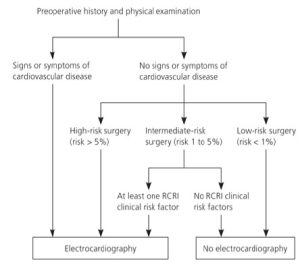Before Non-cardiac Surgery: Guidelines and Recommendations
| Cataract Surgery | No pre-operative testing is indicated. Individual patient history driven. |
| Chest X-Ray | There is no high-quality evidence on the effectiveness of routine pre-operative chest radiography. |
| Coagulation Testing | Patients taking anticoagulants, and those whose history or examination findings suggest an underlying coagulation disorder (e.g., history of spontaneous bruising or excessive surgical bleeding, family history of a known heritable coagulopathy). Bleeding history should be obtained for all surgical patients, and appropriate coagulation testing should be considered if the history is abnormal. Complete Blood Count Recommend testing for select patients based on conditions that would increase the pretest probability of diagnosing anemia (e.g., a chronic liver disease, clinical signs or symptoms of anemia) or procedures in which significant blood loss in anticipated. |
| Urinalysis | Routine urinalysis is not recommended in asymptomatic patients except in those undergoing surgical implantation of foreign material (e.g., prosthetic joint, heart valve) or invasive urologic procedures. |
| Electrocardiogram |  |
| Electrolyte/Creatinine | Routine testing is not indicated but should be considered when compelling historical findings (e.g., hypertension, heart failure, chronic kidney disease, complicated diabetes mellitus, liver disease) and certain medications (e.g., diuretics, angiotensin-converting enzyme inhibitors, angiotensin receptor blockers, nonsteroidal anti-inflammatory drugs, digoxin) should drive the decision to perform preoperative electrolyte and creatinine testing. |
| Glucose/HgbA1c | The guidelines suggest that preoperative random glucose measurement could be considered in patients at very high risk of undiagnosed diabetes on the basis of history, examination, or use of certain medications (e.g., glucocorticoids), and in patients with signs or symptoms of undiagnosed diabetes. |
Reference Sources
Institute for Clinical Systems Improvement, https://www.icsi.org/guideline/perioperative/
American Academy of Family Physicians, https://www.aafp.org/afp/2013/0315/p414.html#afp20130315p414-t1